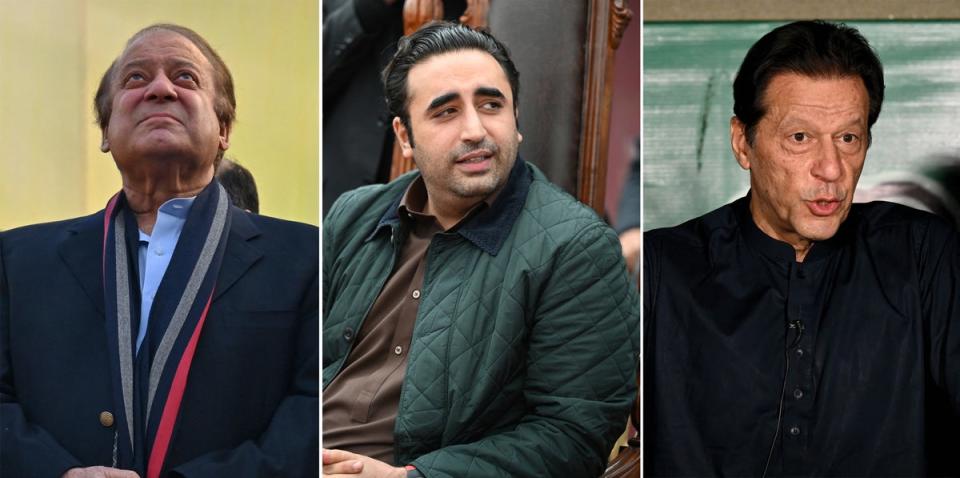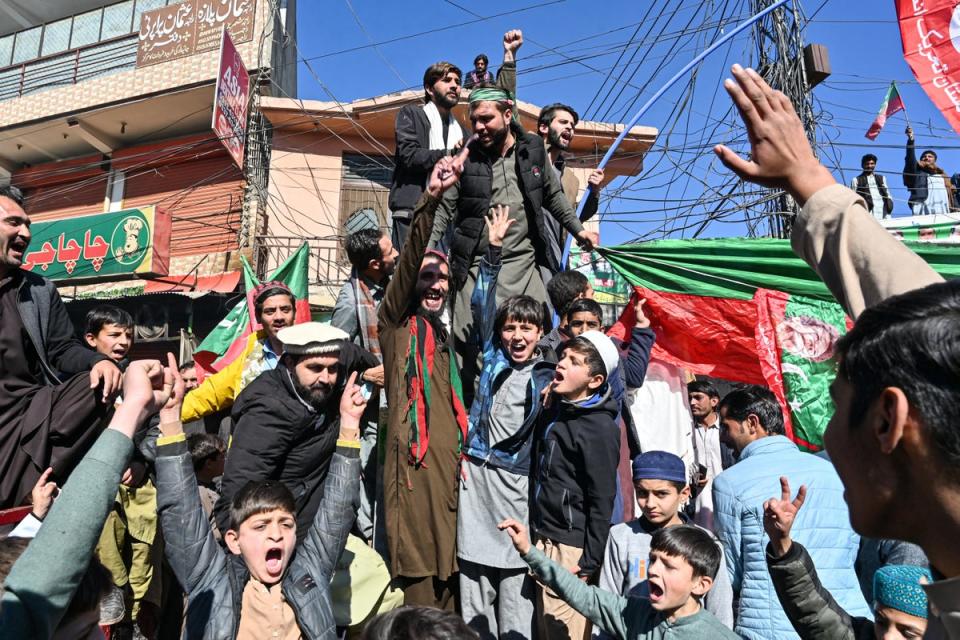Three-time PM Nawaz Sharif confident of win as vote counting underway in Pakistan polls marred by violence
Counting is underway in a general election in Pakistan marred by violence and a suspension of mobile phone services, including the internet.
A clear picture of the result is likely to emerge on Friday morning; a vote that human rights activists and political experts have said amounts to the country’s least credible election.
Thousands of troops were deployed on the streets and at polling stations across the country. Borders with Iran and Afghanistan were temporarily closed as security was stepped up in the wake of more than 20 people being killed in two explosions near electoral candidates’ offices in the southwestern province of Balochistan on Wednesday. Sporadic attacks on Thursday appeared aimed at disputing the vote, including five policemen, who were killed in a bomb blast in the Dera Ismail Khan region, a former stronghold of the Pakistani Taliban.
In all, nine people, including two children, were killed in bomb blasts, grenade attacks and shootings. The two children died in a blast outside a women’s polling station in Balochistan.
The vote comes almost two years after the previous prime minister, cricketer-turned-politician Imran Khan, was ousted in a no-confidence vote. Khan is currently serving a minimum of 14 years in prison after being convicted in three different cases within a span of five days last week. In total he faces more than 150 legal cases against him in what his Pakistan Tehreek-e-Insaf (PTI) party has said is just a clear attempt to keep him out of politics.
Candidates from PTI have been forced to run as independents after the Supreme Court and Election Commission said they can’t use the party symbol — a cricket bat. In Pakistan, parties use symbols to help illiterate voters find them on the ballots.
In spite of the security worries and bitter winter cold, people lined up at polling stations hours before voting was due to start. “The country is at stake, why should I come late?” said 86-year-old Mumtaz, a housewife a decade older than Pakistan itself told the Associated Press as she queued up in Islamabad.
Former prime minister Nawaz Sharif has emerged as the frontrunner, which would represent a remarkable reversal of fortunes for the three-time prime minister, who returned to the country last October after four years of self-imposed exile abroad to avoid serving prison sentences. Within weeks of his return, his convictions were overturned, leaving him free to seek a fourth term in office.

The national assembly has 265 seats and polling in one seat was postponed due to the death of a candidate. A party needs 133 seats for a simple majority but many analysts believe the vote may not produce a clear winner.
Khan, who is an outspoken critic of the influence of Pakistan’s military generals on the country’s administration is only allowed to watch the state broadcaster PTV in prison, and he gets one newspaper a day, the English-language daily Dawn. He planned to watch TV and read the paper on election day, his party said.
“Last night, media channels aired news tickers stating that PTI chief Imran Khan has ‘boycotted the general elections’ to dissuade people from casting their votes,” said Abdur Rehman Shah, a member of the Pakistan Institute of Legislative Development and Transparency think tank.
Political analyst Azim Chaudhry said: “The whole election process seems to be a coronation,” he said.
Mr Sharif, who is believed to be the favoured candidate of Pakistan’s powerful military, brushed off suggestions his Pakistan Muslim League (N) party might not win an outright majority in the parliament and would need to form a coalition to govern.
“For God’s sake, don’t mention a coalition government,” Mr Sharif, flanked by his daughter and active campaigner Maryam Nawaz Sharif, said after casting his vote in Lahore’s upscale Model Town neighbourhood.

Mr Sharif and Khan were joined on the ballot by Bilawal Bhutto Zardari, son of murdered ex-prime minister Benazir Bhutto, and his Pakistan People’s Party.
Both Khan and Mr Bhutto Zardari condemned the shutdown of phone services. Khan called it a cowardly act, while Mr Bhutto Zardari called for services to be restored “immediately”. A journalist in the capital Islamabad told The Independent that a “grim start” marked the elections and the press was left to rely only on wifi services for their coverage of one the most important days in any democracy.
Muhammad Shahid, a resident of Peshawar, told The Independent: “All mobile phone services are suspended, not just the 4G internet. We are not getting the mobile phone signals on our phones and it will also affect the voters who are trying to confirm their votes through SMS.”
Despite the number of troops on the streets, the Pakistani Taliban’s fighters emerged on the streets of northwestern Khyber Pakhtunkhwa, said Mohsin Dawar, a candidate from North Waziristan. The region is identified as a hotbed of Islamist insurgents in northwest Pakistan and has seen rising attacks in the run up to the elections.
Mr Dawar told The Independent that the polling stations in his constituency were taken over by local “Taliban” who were threatening polling staff and locals, a caveat he has regularly warned against.
“The Taliban in the area have taken control of the polling stations. I had written a letter to the concerned DRO about the security situation in Tappi but my letter was ignored,” he wrote in a letter to the Election Commission of Pakistan.
He added that the region has seen a tense security situation for months now, including an attack on him.

 Yahoo News
Yahoo News 
